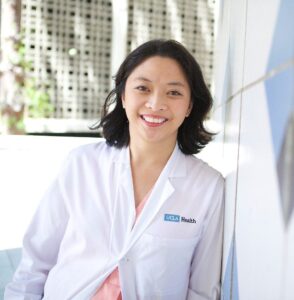Posted By: The American Journal of Human Genetics, AJHG
Each month, the editors of The American Journal of Human Genetics interview an author of a recently published paper. This month, we check in with Valerie Arboleda, MD, PhD, (X: @arboledaVal; BlueSky: @val-arboleda.bsky.social; LinkedIn: Valerie Arboleda) to discuss her recent paper “Prioritizing disease-associated missense variants with chemoproteomic-detected amino acids.”

AJHG: What motivated you to start working on this project?
Valerie Arboleda (VA): The most enjoyable projects often emerge from learning new methods and tackling shared problems. In this case, my friend, co-author (Keriann M. Backus, PhD), and lab neighbor had been generating exciting chemoproteomic datasets from cell lines to investigate how and why cysteine residues exhibit different properties depending on the protein context. At the same time, we had been thinking a lot about rare missense variants and realized we had no idea whether the cysteine residues detected by chemoproteomics were enriched in genes harboring such variants. The rest is what we report in our paper!
AJHG: What about the paper/project most excites you?
VA: My favorite part of this study was realizing that the findings are based on just a small fraction of detected cysteine, lysine, and tyrosine residues. Yet, these datasets are continually expanding and already offer novel insights into missense variant biology—a field that remains largely understudied in the context of genetic disease. I was especially excited to see that chemoproteomic-detected residues were significantly enriched for pathogenic variants in mendelian disease genes compared to non-mendelian disease genes. The most exciting part, though, is thinking about all the other missense variants that remain uncharacterized—as chemoproteomic technology continues to evolve, it holds incredible potential to uncover new layers of functional relevance in the human genome.
AJHG: Thinking about the bigger picture, what implications do you see from this work for the larger human genetics community?
VA: In genetics, we tend to be gene-centric, but the reality is that much of the functional nuance of our genome plays out at the proteomic level, influencing molecular, cellular, and even clinical phenotypes. Traditional assessment of genetic variants often relies on binary classifications, such as loss-of-function or gain-of-function effects; however, this framework is somewhat limited. Some variants may have dual or context-dependent effects depending on the biological mechanism under consideration. Additionally, the position of a variant within a gene can drastically alter its molecular consequences.
This study highlights just the tip of the iceberg in terms of what chemoproteomic data can offer the field of variant interpretation. As datasets grow to include more cell types and disease contexts, we will likely uncover functionally critical residues that are currently overlooked. Genetics needs more empirical data to understand the associations that we see in these large-scale biobanks. By adding an orthogonal, experimentally derived layer of evidence, chemoproteomics doesn’t just help close existing gaps—it provides a concrete, actionable roadmap to improve diagnosis, prioritize functional assays, and catalyze integration of proteogenomic research.
AJHG: What advice do you have for trainees/young scientists?
VA: There are no shortcuts to meaningful discovery. Sometimes you get lucky, but most of the time, you simply have to do the experiment and see what happens. As you think about building a career you enjoy, take stock of what you genuinely like about research on a day-to-day basis. No job is perfect—there will always be aspects you don’t love. The key is whether the worst part of the job is something you can tolerate. A bit of honest introspection can go a long way. Finally, don’t underestimate the importance of having a community at work. Strong, like-minded relationships can transform a job into something more meaningful—a career you’re excited to grow in for the long haul.
AJHG: And for fun, tell us something about your life outside of the lab.
VA: I love being outdoors—exploring the wilderness, hiking in remote areas, and sharing those experiences with my kids. Even during my clinical and research training, I worked hard but always made sure to carve out time to recharge. Finding that balance has been key to sustaining both my energy and my passion for the work.
Valerie Arboleda, MD, PhD, is an Associate Professor of Pathology & Laboratory Medicine, of Human Genetics, and of Computational Medicine at the David Geffen School of Medicine at UCLA.
